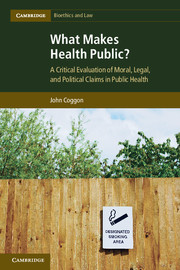 What Makes Health Public?
What Makes Health Public? Book contents
- Frontmatter
- Contents
- Foreword
- Acknowledgements
- What makes health public?
- Part I Basic concepts in public health
- Part II Evaluating evaluations: making health public
- Part III Tackling responsibility: liberal citizens as subjects and sovereigns
- 10 Liberal citizens: defining non-individuated individuals
- 11 Health made public: rights, responsibilities, and shared concerns
- 12 Conclusion
- Bibliography
- Index
- References
11 - Health made public: rights, responsibilities, and shared concerns
from Part III - Tackling responsibility: liberal citizens as subjects and sovereigns
Published online by Cambridge University Press: 05 June 2012
- Frontmatter
- Contents
- Foreword
- Acknowledgements
- What makes health public?
- Part I Basic concepts in public health
- Part II Evaluating evaluations: making health public
- Part III Tackling responsibility: liberal citizens as subjects and sovereigns
- 10 Liberal citizens: defining non-individuated individuals
- 11 Health made public: rights, responsibilities, and shared concerns
- 12 Conclusion
- Bibliography
- Index
- References
Summary
Introduction
In this chapter I present some of the implications of the political liberalism described in Chapter 10 for analysis in public health law and ethics. This book has demonstrated the need to commit to a political model or framework for any meaningful normative discussion to take place in relation to public health. Thus, even readers who are opposed to the political position that I take should be able to see and accept the wider analytic and ‘methodological’ point about political engagement with public health issues. The political context that I defend includes in its community people with and without their own decision-making capacity, and narrows the legitimate freedom people have to act on some of the decisions they would make. This applies not only where their actions themselves may cause harm to others, but also where a general and perhaps generally latent freedom that would allow them to perform harmful acts would lead to unacceptable harm amongst members of the wider population. In this sense, not only are people part of the environment, but their legal rights, freedoms, and so forth are too. Such a point is well demonstrated by a claim made by the British Medical Association’s (BMA) Board of Science in its report “Under the influence – The damaging effects of alcohol marketing on young people”. Alcohol regulation is one of the BMA’s four public health priorities. Core to the argument in the report is that excessive alcohol consumption is a public health problem, and that young people (by which it means people under 25) face particular problems. However, the Board of Science rejects the idea that simply targeting young people will provide a satisfactory response. Rather, it argues, regulations to protect this group must be targeted across the board. The report describes the regulatory system in the UK as providing a “pro-alcohol environment”, where advertising, popular culture, marketing, fiscal arrangements, and widespread availability are amongst the malign factors that conspire in sustaining an unacceptable public health problem. Elsewhere I have suggested that the BMA’s position is interesting:
Not least as each person’s part in the “pro-alcohol environment” means even directly harmless, or only self-harming behaviour, may be a matter of public interest: my freedoms to extol the joys of drinking, to buy alcohol at any time of the day, to consume intoxicating drinks that taste non-alcoholic, to see entertainment that is subsidised by the industry, to drink cheaply, and to find dense collections of bars, pubs, and clubs are all harmful, even if I do not exercise them. In other words, the apparently benign presence of latent or responsibly exercised freedoms amongst some citizens is deemed to be sufficiently troublesome that they must be curbed for the greater good.
What we see here then is the importance of the ‘context’ provided by general rights, which clearly can be mapped onto the concept of public discussed in Chapter 2. Likewise, we see an argument advanced by the BMA in favour of a specific manifestation of ‘collateral paternalism’ in the context of public health policy. More generally, much of the recent upsurge of interest in the fields of public health law and ethics is evidenced in works that address the sorts of observations underpinning the BMA report, and develop or criticise the sorts of arguments that it raises. There are disputes about the understandings of, rationales for, and means of allocating responsibilities when we understand the community to comprise people who can not always take responsibility for themselves. And beneath these disputes is the problem of there being something inherently contestable in claims about what constitutes harm and benefit, and by implication in terms such as ‘health’.
- Type
- Chapter
- Information
- What Makes Health Public?A Critical Evaluation of Moral, Legal, and Political Claims in Public Health, pp. 235 - 264Publisher: Cambridge University PressPrint publication year: 2012
